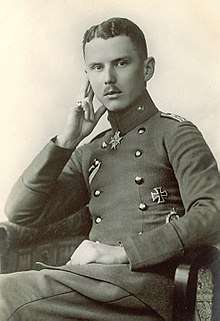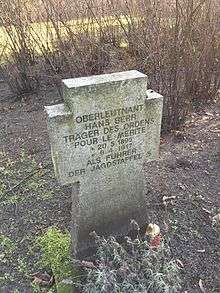Hans Berr
Oberleutnant Hans Berr (20 May 1890–6 April 1917) was a professional soldier turned World War I flying ace credited with ten aerial victories. He was one of the German aces who pioneered the world's first fighter airplane, the Fokker Eindekker "flying gun".[1][2][3]
Hans Berr | |
|---|---|
 Hans Berr in 1916 | |
| Born | 20 May 1890 Braunschweig, Duchy of Brunswick |
| Died | 6 April 1917 Vicinity of Noyelles |
| Allegiance | German Empire |
| Service/ | Infantry; aviation |
| Years of service | 1908 - 1917 |
| Rank | Oberleutnant |
| Unit | 4th Magdeburg Reserve Regiment Light Infantry, KEK Avillers |
| Commands held | Jasta 5 |
| Awards | Pour le Merite, Royal House Order of Hohenzollern, Iron Cross First Class, Military Merit Order, Reuss War Merit Cross, Brunswick War Merit Cross, Hanseatic Cross |
Early life and service
Hans Berr was born in Potsdam on 20 May 1890. The descendant of French Huguenots, his ancestor, Charles Berre de Varennes, left France and changed his name to Karl Berr, establishing a private postal service. Hans Berr joined the army as an infantry lieutenant in 1908. When the war broke out, he was serving with Magdeburgisches Jäger-Bataillon Nr. 4. A month into his war, on 26 September 1914, Berr was seriously wounded.[3] On 27 January 1915, he was promoted to Oberleutnant.[1]
Flying service
In March, he began aerial service as an observer/gunner, though he subsequently took pilot training. While assigned to an ad hoc unit of Fokker Eindekker fighters at Avillers, he shot down a Nieuport and a Caudron during March 1916. Berr was then given command of newly founded Jasta 5. Because of Berr's teaching of tactics, the new squadron began a run of victories that would result in its being dubbed the KanonestaffelIn ("squadron of aces"). In the four weeks from 7 October to 3 November 1916, Berr shot down seven enemy airplanes and an observation balloon. On 10 November, he received the Knights Cross and Swords of the Royal House Order of Hohenzollern. The Pour le Merite followed, on 4 December 1916, Berr being the last German flier to receive it for eight victories.[1][2]
Aerial victory list
| No. | Date/time | Aircraft | Foe | Location | Notes |
|---|---|---|---|---|---|
| 1 | 8 March 1916 | Fokker Eindekker | Nieuport | Verdun | Casualty from French Escadrille MS3 |
| 2 | 14 March 1916 | Fokker Eindekker | Caudron | Northwest of Verdun | |
| 3 | 7 October 1916 @ 1010 hours | Caudron | Combles | ||
| 4 | 7 October 1916 | Royal Aircraft Factory B.E.12 | Combles | Casualty from No. 34 Squadron RFC | |
| 5 | 20 October 1916 @ 1700 hours | Royal Aircraft Factory FE.2b | Southeast of Le Transloy | ||
| 6 | 22 October 1916 @ 1100 hours | Morane Parasol | Sailley | Casualty from No. 3 Squadron RFC | |
| 7 | 26 October 1916 @ 1800 hours | Royal Aircraft Factory FE.2b (s/n 4933) | Le Transloy | Casualty from No. 18 Squadron RFC. Both 2nd Lt. Philip Forsyth Heppel and 2nd Lt. H.B.O. Mitchell WIA and POW | |
| 8 | 26 October 1916 @ 1810 hours | Observation balloon | South of Maurepas | ||
| 9 | 1 November 1916 @ 1615 hours | Caudron | Southeast of Courcelette | ||
| 10 | 3 November 1916 @ 1745 hours | Royal Aircraft Factory B.E.2 | Northwest of Martinpuich[1][2] | ||
Death in action

On Good Friday, 6 April 1917, Berr and his wingmate Paul Hoppe collided and were killed while engaged in combat[3] with No. 57 Squadron RFC.[1]
Hans Berr is buried in the Alter Friedhof Teltower-Vorstadt cemetery, Potsdam, Germany.[4]
Sources of information
- Above the Lines: The Aces and Fighter Units of the German Air Service, Naval Air Service and Flanders Marine Corps 1914 - 1918. p. 71.
- The Aerodrome website http://www.theaerodrome.com/aces/germany/berr.php Retrieved on 21 April 2010.
- Early German Aces of World War I. p. 35.
- Billiongraves website: https://billiongraves.com/grave/Hans-Berr/18031750 Retrieved 23 November 2017.
References
- Above the Lines: The Aces and Fighter Units of the German Air Service, Naval Air Service and Flanders Marine Corps 1914 - 1918 Norman L. R. Franks, et al. Grub Street, 1993. ISBN 0-948817-73-9, ISBN 978-0-948817-73-1.
- Early German Aces of World War I. Greg VanWyngarden, Harry Dempsey. Osprey Publishing, 2006. ISBN 1-84176-997-5, ISBN 978-1-84176-997-4.
- Jagdstaffel 5 Volume One G K Merrill. Albatros Productions, Ltd, 2004. ISBN 1-902207-67 X.
External links
- Findagrave website also has a photograph of Hans Berr's grave at https://www.findagrave.com/memorial/183102273/hans-berr#view-photo=160376675